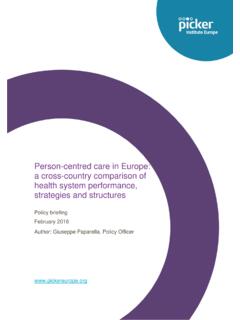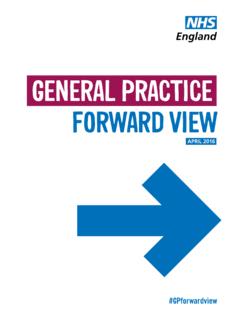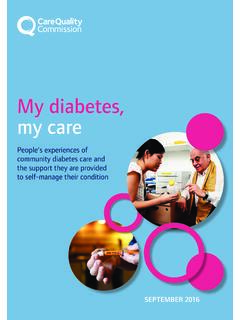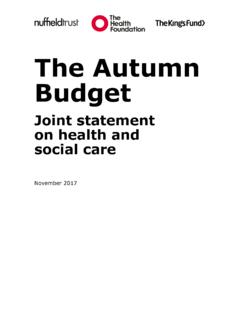Transcription of Understanding staff wellbeing, its impact on …
1 Understanding staff wellbeing , its impact on patient experience and healthcare quality June 2015 Author: Giuseppe Paparella, Policy Officer In association with the Centre for Mental Health Picker Institute Europe Picker Institute Europe is an international charity dedicated to ensuring a positive experience of health and social care is everyone s experience . We are here to: Influence policy and practice so that health and social care systems are always centred around people s needs and preferences. Inspire the delivery of the highest quality care, developing tools and services which enable all experiences to be better understood.
2 Empower those working in health and social care to improve experiences by effectively measuring, and acting upon, people s feedback. Picker Institute Europe June 2015 Published by and available from: Picker Institute Europe Buxton Court 3 West Way Oxford, OX2 0JB England Tel: 01865 208100 Fax: 01865 208101 Email: Website: Registered Charity in England and Wales: 1081688 Registered Charity in Scotland: SC045048 Company Limited by Registered Guarantee No 3908160 Picker Institute Europe has UKAS accredited certification for ISO20252: 2012 (GB08/74322) and ISO27001:2005 (GB10/80275). Picker Institute Europe is registered under the Data Protection Act 1998 (Z4942556).
3 This research conforms to the Market Research Society s Code of Practice. Contents Introduction 1 What is meant by wellbeing ? ` 3 Evidence about staff wellbeing 5 Raising concerns about unsafe clinical practice 5 Implications 7 wellbeing & productivity 7 wellbeing & patient care
4 8 Improving staff wellbeing 11 Conclusion 14 References 15 2015 Picker Institute Europe. All Rights Reserved. 1 Policy briefing on NHS staff wellbeing | GP | June 2015 | [Unclassified] Introduction Patient experience is widely recognised as an important component of quality care. Both relational and functional aspects of care influence health outcomes related to safety and effectiveness. Functional aspects relate to basic expectations about how care is delivered, such as attention to physical needs, timeliness of care, clean and safe environments and effective coordination between services.
5 Relational aspects, on the other hand, refer to the interpersonal aspects of care the ability of clinicians to empathise, respect patients preferences, include them in decision making and provide the information to enable self-care. patients expect health professionals to put their interest above other considerations and to be honest and transparent when something goes wrong, and good interpersonal care is highly valued by those using health services. Good relational care depends heavily on health professionals as individuals and has substantial benefits. Effective communication between clinicians and patients involving, for example, empathy, communication, respect for beliefs and concerns, and provision of clear information will promote patient trust, which can benefit safety and effectiveness in a number of ways.
6 Measures of patient experience can, therefore, provide valuable insight into the delivery of high quality care: and NHS staff play a fundamental role, since health professionals are responsible for delivering everyday care in both its relational and functional aspects. The number of staff in the NHS has grown substantially over the last decade. According to the latest NHS staff census available, in England there were 1,387,692 staff in the NHS as at 30 September 2014. This marked an increase of 23,527 ( ) since 2013, and an increase of 126,832 ( ) since 2004 (an average annual increase of per year).1 The latest annual count of all personnel working in the NHS showed an increase across all NHS staff groups and GPs since 2003.
7 However, the total number of staff in the NHS is not the only element to show significant growth. According to the latest figures released by the Health and Social Care Information Centre (HSCIC), NHS staff sickness absence has increased significantly in the last year. In addition to that, there are also hidden costs of mental ill health among staff : presenteeism described as the act of attending work while sick costs more than twice as much as absenteeism for this and the total cost to the NHS of staff illness relating to mental health is ( 1,000 per employee).2 As acknowledged in the NHS Five Year Forward View published earlier in October 2014, increases in NHS staff numbers have not fully reflected changing patterns of demand, and the growing pressures on staff as indicated by the rise of sickness absence rates just confirms such a Recruiting more suitably qualified, skilled and experienced staff therefore appears to be the top priority for the new government.
8 All 1 Workforce and Facilities, Health and Social Care Information Centre (2015, March 25). NHS Workforce: Summary of staff in the NHS: Results from September 2014 Census. Available at 2 Centre for Mental Health. (2007, December 13). Mental health at work: developing the business case. Available at 3 NHS England (2014, October 20). Five Year Forward View. Available at 2015 Picker Institute Europe. All Rights Reserved. 2 Policy briefing on NHS staff wellbeing | GP | June 2015 | [Unclassified] major parties participating in the 2015 general election were in accord on the need for more staff : the Conservative manifesto, in particular, included a pledge to recruit 9,500 more GPs and 6,900 more nurses by 2020.
9 However, as reported by the NHS Five Year Forward View, in order to attract skilled professionals and to make them more efficient in providing high quality care, the NHS should take care of and support the health and wellbeing of frontline staff . staff wellbeing , therefore, remains a central concern for the NHS. In the following paragraphs we will investigate further what is meant by wellbeing of the workforce. In addition, we will try to understand what the broader implications are of changing staff wellbeing on patient care. Finally, further actions to improve staff wellbeing in the NHS will be suggested. 2015 Picker Institute Europe.
10 All Rights Reserved. 3 Policy briefing on NHS staff wellbeing | GP | June 2015 | [Unclassified] What is meant by wellbeing ? The most important and relevant contributions on the idea of wellbeing and workforce wellbeing have perhaps been provided in chronological order by the World Health Organisation (1948), the Carol Black Review (2008), and the Boorman NHS Health & wellbeing Review(2009). According to the World Health Organisation, health and wellbeing is a state of complete physical, mental and social wellbeing and not merely the absence of disease or infirmity . This definition is part of the Preamble to the Constitution of the World Health Organisation, as adopted by the International Health Conference on 7 April 1948.









